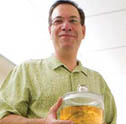Director's Page
Richard J. Servatius, Ph.D.

Richard J. Servatius, Ph.D.
Dr. Richard Servatius is the Director of the Stress & Motivated Behavior Institute (SMBI). A leader in his field, Dr. Servatius holds the rank of full Professor of Neurology and Neurosciences at the New Jersey Medical School (NJMS) of the University of Medicine and Dentistry of New Jersey (UMDNJ). Dr. Servatius also serves as the Graduate Program Director for Neuroscience at UMDNJ-Graduate School of Biomedical Sciences (BSBS) Newark. He is also on the Steering Committee for the Biomedical Engineering Program, an interinstitutional graduate program between UMDNJ-GSBS Newark and the New Jersey Institute of Technology (NJIT). In addition to his academic role he is the Director of the NeuroBehavioral Research Laboratory (NBRL) at the New Jersey Health Care System (NJHCS). Research conducted in the NBRL targets veterans' health.
A neuroscientist and experimental psychologist, Dr. Servatius trained at the State University of New York, College at Cortland were he received a Master's degree in Experimental Psychology in 1989 under the guidance of David F. Berger, Ph.D. and James J. Starzec, Ph.D. The first graduate student of Neuroscience at the GSBS-Newark, Dr. Servatius trained with Benjamin H. Natelson, M.D. and John E. Ottenweller, Ph.D. graduating in 1993. Postdoctoral training was accomplished with Tracey J. Shors, Ph.D. at Princeton University (1993-1995).
Dr. Servatius established the SMBI in 2002 to bring together leading neuroscientists, biologists, psychologists, medical doctors and engineers to support the United States military's efforts to understand stress-related mental and physical illness. Today, through its partnership with the Armament Research, Development and Engineering Center (ARDEC) at the Picatinny Arsenal in Morris County, New Jersey, the SMBI provides intellectual and academic support for behavioral experimentation related to soldier training and effects of non-lethal stimuli on combatant behavior.
